Cheetah population declines 90% in 100 years:
An interview with Rebecca Klein of Cheetah Conservation Botswana
Rhett A. Butler, mongabay.com
September 30, 2008
The planet’s fastest land animal is falling behind in its race for survival against habitat encroachment, loss of prey, the illegal wildlife trade, and human-wildlife conflict.
Once found widely across the African continent to Kazakhstan in the north to Burma in the East, the cheetah has seen a dramatic reduction of its range and numbers in recent centuries as livestock holders have killed off the cat as a threat to their livelihoods. Today the cheetah clings to strongholds in only a few African nations. Among these is the southern African country of Botswana, which harbors large expanses of prime cheetah habitat.
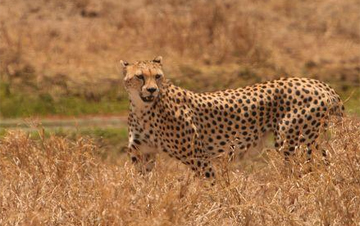 Cheetah |
Still even in Bostwana, the cheetah faces challenges. Despite having one of the world’s lowest population densities (3 people per sq km), over the past generation Botswana has seen a sharp rise in commercial cattle ranching. This activity — made possible by the drilling of deep boreholes that provide water in an otherwise water-limited landscape — have put typical cheetah prey in direct competition with livestock, reducing their numbers and driving increased conflict between cheetah and domestic animals.
With this as a backdrop, Cheetah Conservation Botswana (CCB) is working to preserve the country’s cheetah population through scientific research and community outreach and education. CCB monitors wild cheetah to gain critical insight into their ecology, health and behavior; rehabilitates orphaned cheetah cubs; and is establishing programs to help farmers more effectively protect their livestock from predators. CCB is also looking at ways to promote wildlife conservation through economic incentive programs, including “Predator Friendly Beef” and alternative livelihood initiatives for rural communities.
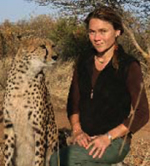 Rebecca Klein |
In an interview ahead of an upcoming appearance in the U.S., CCB co-founder Rebecca Klein spoke about her organization’s work and its efforts to conserve cheetahs while delivering benefits to local communities. CCB is partially supported by the Wildlife Conservation Network (WCN), an innovative group that uses a venture capital model to protect some of the world's most endangered species. WCN will be hosting Klein at its upcoming Wildlife Conservation Expo in San Francisco, California on October 4th. Expo attendees will be able to meet Klein and learn more about CCB firsthand. The event, which is open to the public and costs $25-50 per person, also features 16 other conservationists working to protect wildlife around the world.
AN INTERVIEW WITH REBECCA KLEIN OF CHEETAH CONSERVATION BOTSWANA
Mongabay: What led you to cheetahs in Botswana?
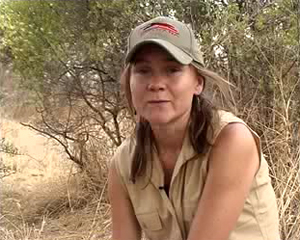 Video capture of Rebecca Klein. Take a look at CCB’s videos. |
Rebecca Klein: I grew up in Africa and Asia in remote places so I grew to love the wilderness. I decided I wanted to work in conservation at a young age and was particularly drawn to endangered species and threatened habitats. I’d always wanted to visit Botswana as it sounded wild and beautiful. So found a voluntary job at Mokolodi Nature Reserve, part of which involved looking after 2 orphaned cheetah brothers. I fell in love with the species and decided I’d found my niche, to work towards their conservation and the Kalahari ecosystems.
Mongabay: What methods do you use to study cheetahs?
Rebecca Klein: Track surveys, camera trap surveys, satellite telemetry, community surveys, scat collection, disease and genetic sampling.
Mongabay: Why are cheetahs at risk in Botswana?
Rebecca Klein: Mainly from human-wildlife conflict and illegal trade.
Mongabay: How well protected are cheetah?
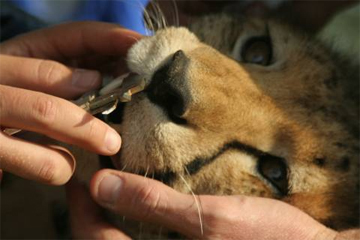 Measuring the teeth of a cheetah. Courtesy of CCB. |
Rebecca Klein: They are protected and cannot be hunted. However, they can be lethally removed if they are considered to be causing a threat to human life and property.
Mongabay: Do you know if the cheetah situation in Botswana representative of that for other parts of the continent?
Rebecca Klein: Botswana’s cheetahs are doing well in comparison to many other African countries. Botswana still has wilderness areas and good prey populations. However, conflict due to human encroachment is increasing and the cheetah is under threat as throughout Africa.
Mongabay: In report you mention boreholes as a significant development in Botswana. How are these affecting wildlife in general in Botswana?
Rebecca Klein: Deep boreholes open up areas of wilderness that could not be used for permanent livestock pastures in the past due to low rainfall. Now these boreholes bring up underground water and make it possible for livestock and people to move into these areas. Now livestock compete for the grazing and water and wildlife gradually decreases.
Mongabay: Is industrial agriculture displacing hunter-gathers and rural populations?
Rebecca Klein: Yes, more commercial ranches have been designated over the last 20 years. The population is becoming increasingly sedentary.
Mongabay: Do these farms offer less employment compared to small-holder plots and traditional livelihoods?
Rebecca Klein: They give ownership of the land over to a few, whereas previously this land was available for use by the whole tribe and managed by the chiefs. So yes it decreases the number of people which benefit from the resources of these areas.
Mongabay: How significant is the illegal trade in cheetah? Who is buying?
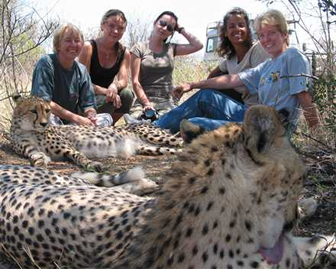 (left to right) Dr Kyle Good (CCB), Rebecca Klein (CCB), two CCB volunteers, and Ann Marie Houser. Courtesy of CCB. |
Rebecca Klein: Its estimated about 100 cheetahs leave Botswana each year. They go to supply the canned hunting trade and the illegal international wildlife trade.
Mongabay: How big a risk are disease outbreaks among cheetah? If they are a significant risk, is vaccination an option, either of cheetah or domestic animals?
Rebecca Klein: There have been no major disease outbreaks in cheetah in Botswana. Anthrax is a particular concern and we vaccinate against this in cheetahs that CCB captures and releases.
Mongabay: Can cheetah recover quickly if provided with suitable habitat and prey?
Rebecca Klein: Yes, they do well in the absence of stronger predators such as lion and hyena, often raising litters of 5 cubs which grow to adulthood.
Mongabay: Some research seems to suggest a higher density of cheetah in agricultural areas. Is peaceful co-existence between cheetah and farmers possible?
Rebecca Klein: Yes if people take responsibility to manage their farms and livestock well using appropriate grazing management strategies, livestock husbandry and non-lethal methods of predator control.
Mongabay: Are there compensation programs for livestock killed by cheetah?
Rebecca Klein: Yes in Botswana cheetah losses are compensated.
Mongabay: How is your work received by local communities?
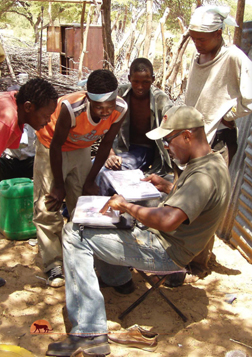 Community outreach. Courtesy of CCB. |
Rebecca Klein: Communities appreciate our approach which is to promote coexistence for the benefit of both rural community welfare and biodiversity conservation.
Mongabay: What are ways local people can benefit from cheetah conservation?
Rebecca Klein: Ecotourism is the most achievable option. Also, through the eco-labeling of products form natural resources as wildlife friendly. Predator friendly beef is a potential opportunity.
Mongabay: Can tourism compete as a form of land use relative to beef?
Rebecca Klein: It is much more sustainable and less reliant on rainfall.
Mongabay: How productive is cattle ranching?
Rebecca Klein: In the Kalahari is can be very productive with good rainfall years but as rainfall is variable this is not assured. Overstocking and overgrazing are causing land degradation and bush encroachment and causing potential long term damage to this sensitive environment. Wildlife based initiatives will be a much more sustainable form of land use.
Mongabay: Is beef a major source of employment or just a powerful lobby?
Rebecca Klein: Both and it is also a strong part of the Tswana culture to keep herds of cattle.
Mongabay: What’s your outlook for the cheetah and more generally the wild lands of Botswana?
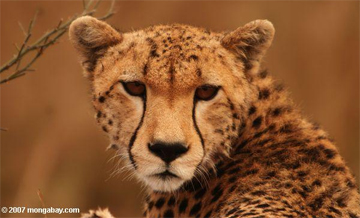 Cheetah |
Rebecca Klein: At the moment it is good. There is a national move towards empowering communities to sustainably utilize their natural resources through alternative livelihoods. If this can be successful wildlife will begin to have more value at individual and community level. This will encourage the conservation of habitats and biodiversity.
Mongabay: Have you looked at the potential impact of climate change on wildlife in the region?
Rebecca Klein: Yes and this if rainfall declines in the Kalahari cattle farming will not be a feasible land use. It is already leading to reduced grazing, bush encroachment and desertification.
Mongabay: How can in the U.S. people help?

|
Rebecca Klein: By raising awareness for global conservation and supporting programs both locally and internationally through giving assistance through time, energy and funds. Whatever you have most of!
Mongabay: Any tips for aspiring conservationists?
Rebecca Klein: Keep focused and dedicated. Get your degree, preferably a Masters or PhD. Be prepared to volunteer to get experience.
Dont give up! There’s a lot of competition everywhere these days but there is so much that needs to be done!
Related
Group takes “venture capital” approach to conservation
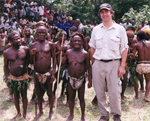
|
(09/16/2008) An innovative group is using a venture capital model to save some of the world’s most endangered species, while at the same time working to ensure that local communities benefit from conservation efforts. The Wildlife Conservation Network (WCN), an organization based in Los Altos, California, works to protect threatened species by focusing on what it terms “conservation entrepreneurs” — people who are passionate about saving wildlife and have creative ideas for dong so. After a rigorous review process to identify and select projects that will have the greatest impact on conservation in developing countries, WCN provides the conservationist with fund-raising and back-office support, technology, and access to its network of people and resources.














